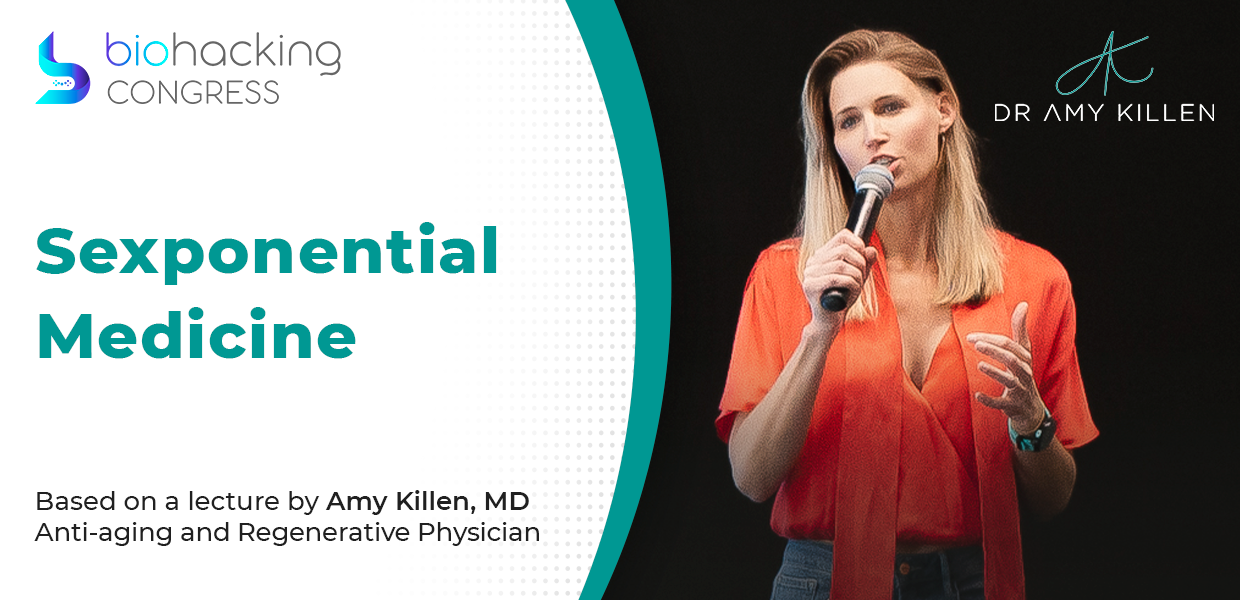Sexponential Medicine
“About a year ago, I saw a woman in my practice who was in her mid-40s, and she was very into biohacking, tried various biohacking supplements and biohacking products. But she was having some orgasmic problems, and she had tried everything she could to fix the issue. She came to see me, and we talked about some causes of sexual dysfunction. I looked at her hormones, lifestyle, and relationship. Ultimately, I ended up doing a series of procedures on her - I did stem cell injections into her clitoris and vagina as well as exosome and PRP injections. I did a biohacking technology, an infrared light intravaginal laser in the office, and then I sent her home with a red light therapy intravaginal device for home.
“Three or four months later I called, without me even asking how was she, she just starts going off about how great she's doing: ‘Oh, I'm having all these amazing orgasms, and I had no idea it could be like this,’ and she keeps talking and talking and all of a sudden she stops and she says ‘Oh, I gotta go, it's my turn to the TSA security line in the airport.’ The entire time that we had been talking, she was in the line. It is a pretty great endorsement of something that I call sexponential medicine.” Amy Killen, MD, Anti-aging and Regenerative Physician recalled.

Sex has a long list of benefits, Dr. Amy covert some of the high points as emotional benefits. “We know that people who are more sexually active and when we say sexually active it's usually defined as having sex one to two times a week. Those people tend to have less anxiety, less depression, a better self-image that leads to happiness. We also have some cognitive benefits of sex. People who are more sexually active as they get older tend to have less cognitive decline, and this has been shown in several studies, especially in men, there's some evidence that it affects the hippocampus.
“People who are having sex regularly are generally going to have less migraine as well as tend to sleep better. There's a link between sex and immune function. A study on college kids found that college kids who were having sex one to two times a week had better salivary IgA levels and could fight viruses and colds better than their classmates.
“Regular sex life affects your blood pressure, it tends to be lower. There's an association between active sex life and lower cardiovascular disease rates of death as well as all-cause mortality.”
Despite all physical benefits, sex impacts our social behavior. Sex allows you to connect with your partner in a way that a lot of other things don't. “When I have someone who comes to see me, they don’t complain about sexual dysfunction, high blood pressure, and immune function is not very good. What they complain about is that they feel disconnected from their partner.
“This is a big deal because we live in a world where loneliness and disconnection kill as many people as obesity and alcohol use. 20% of marriages are sexless, and 17% of millennials check their smartphones during sex,” Dr. Amy highlighted.

Dr. Amy shared her four-pronged approach to achieving sexual longevity. It is the sexponential tools and tricks that you can use.
1. Mind the Mind
Biohacking your brain, you biohack the biggest sex organ. It's where desire starts and ends; sometimes, it's where erections start and also where they end. “Stress is a huge contributor to sexual dysfunction in both men and women. Many of us are chronically stressed, and we're chronically in this sympathetic state which is not ideal. Some ancient practices can work great -- mindfulness practices, breathwork, journaling, exercise. It will help get you in the right headspace,” Dr. Amy mentioned.
2. Boost Blood Flow
Your sexual organs, like any organs in your body, appreciate good blood flow. As we get older and develop atherosclerosis and plaque in our arteries, those arteries become narrower. Suddenly, you're not getting as much blood to the genitalia, which is one of the leading causes of erectile dysfunction.
To increase blood flow, we need to maximize or maintain or reduce our nitric oxide levels, which produce less in the body as we get older.
“Nitric oxide is the main chemical messenger that tells our blood vessels to vasodilate (to open up), and it's important for getting blood to all parts of your body. The endothelium makes nitric oxide; one of the places it's made is the inside of your blood vessels, and as you get older, you start to develop plaque atherosclerosis in your blood vessels. Those cells become dysfunctional, you can't make as much nitro nitric oxide as you could. When you're 40-year-old you're making about half as much nitric oxide as your 20-year-old friends,” Dr. Killen explained.
However, a healthy lifestyle with good exercise and a balanced diet can help you to maintain a nitric oxide production level a little bit longer, but the level does go down with time.

3. Optimize Hormones
The primary sex hormones are testosterone, estrogen, progesterone, DHEA, cortisol, thyroid, and growth hormones. Many of these hormones will go down with age, especially after menopause for women and andropause for men, which happens approximately in the 40s to 50s.
“These hormones are important not just for helping your brain be interested in sex maintaining libido but also for maintaining the structural health of your genital and sexual organs. For instance, women who go through menopause lose their estrogen, testosterone, progesterone. We see that they are less interested in sex and that the vaginal tissues start to thin, become friable, and start to atrophy. You start to have less lubrication and more pain. All of this is because you don't have your hormones,” Dr. Amy described.
Estrogen does the same thing to skin. When you start losing your estrogen, your skin also starts to thin. Testosterone, similarly, is essential for libido, but as it starts to go down at the age of 40 or so, then that can also affect the health of the penis.“
“Men who have chronically low testosterone levels have elastic, smooth muscle cells that live within their penises, and they fill with blood, and they stretch. If you have low testosterone over time, those cells can get replaced by fat tissue or by scar tissue, and all of a sudden, those cells are not as stretched as they used to be. When that happens, you cannot maintain erections, so this is the main cause of the venous leak. It’s not a problem with veins. It’s just a smooth muscle cell problem. Low testosterone is one cause, another cause is just inflammation, so anything that causes inflammation can cause those little cells to lose their elasticity.” Dr. Killen continued.
4. Support the Structures
“Supporting the structures is anything that we can do to improve the health of the sexual organs,” Dr. Amy explained as well as went into details of regenerative biologics in-office devices and home at-home devices.
“Regenerative biologics include platelet-rich plasma and stem cell exosomes. Stem cell therapy uses regenerative biologics to activate the stem cells already in your body to increase activity and make them more productive. As we know, our stem cells become less effective as we get older. These procedures are dedicated to activating your own body's healing responses. We get platelet-rich from your blood, then centrifuge that and inject that to you.
“I've also used exosomes as standalone treatments, and they have some of the benefits of stem cells without having to do a procedure on the patient. That's more invasive.”

BiohackingCongress's Team is very grateful to Amy Killen, MD, for joining the biohacking conference and giving an incredible lecture.
Watch full Dr. Killen's 40-minute lecture on Sexponential Medicine and 50+ lectures, panel discussions, and performances from renowned biohackers on biohacking your body with a BiohackingCongress year-long subscription. Get your access to a healthy future now! Follow this link.
Based on the lecture by Amy Killen, MD.
Special Access to
Exclusive TopBiohacks
and more


